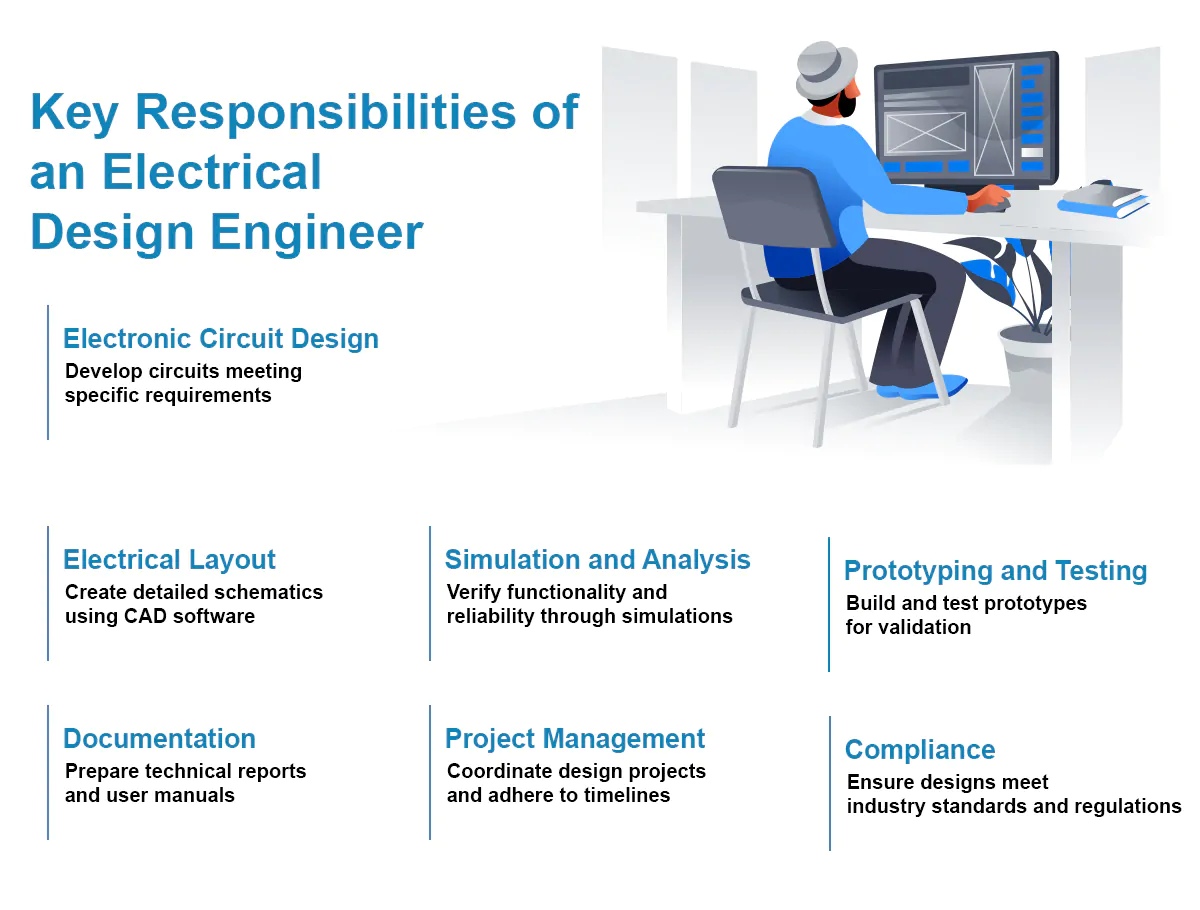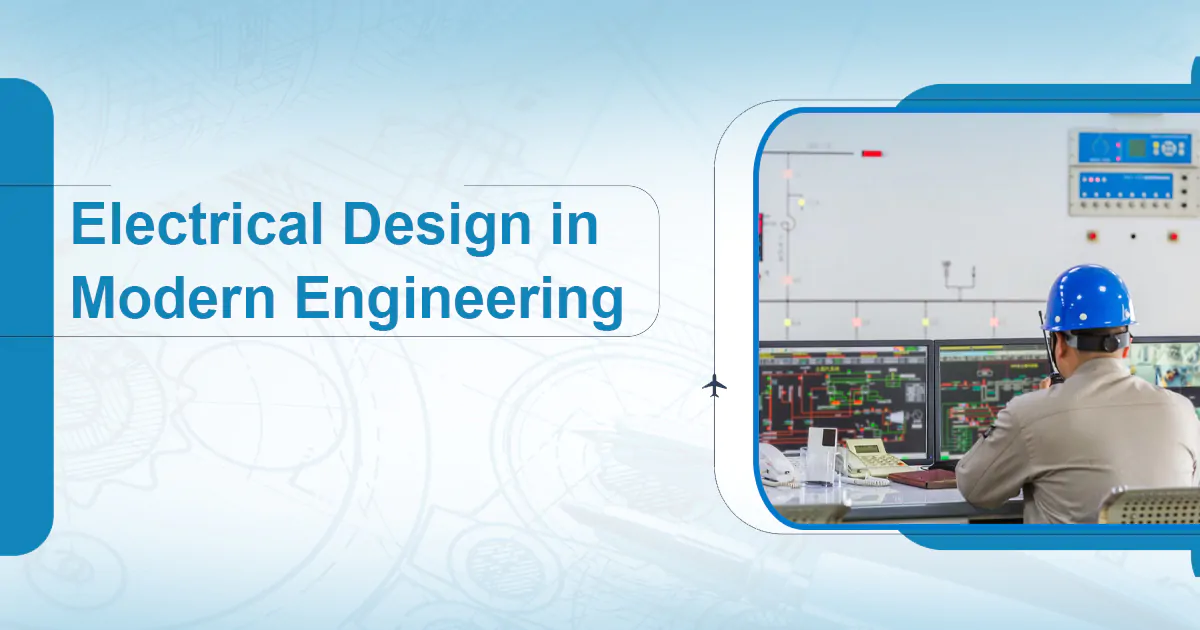In today’s technologically advanced world, electrical design plays a crucial role in modern engineering. From consumer electronics to industrial machinery, electrical systems are at the heart of almost every product and process.
As technology continues to evolve, the demand for efficient and reliable electrical design has never been greater. This article will explore the role of modern electrical engineering, highlighting its importance, the responsibilities of an electrical design engineer, and the various aspects of electrical design services.
Electrical Design: The Backbone of Modern Engineering
Electrical design is a fundamental aspect of modern engineering, as it encompasses the creation, development, and implementation of electrical systems and components. It is a multifaceted discipline that involves the integration of various electrical principles, electronic circuit design, and computer-aided design (CAD) tools.
In the realm of modern engineering, electrical design plays a vital role in numerous industries, including:
- Electronics and Consumer Products
- Automotive and Transportation
- Renewable Energy and Power Systems
- Industrial Automation and Control Systems
- Telecommunications and Communication Networks
- Medical and Healthcare Technology
An electrical design engineer is responsible for ensuring that electrical systems and components function efficiently, safely, and in compliance with industry standards and regulations.
The Electrical Design Engineer: A Multifaceted Professional
An electrical design engineer is a highly skilled professional who combines theoretical knowledge with practical expertise to design, develop, and implement electrical systems and components. Their responsibilities are diverse and span across various stages of the engineering process.
Some of the key responsibilities of an electrical design engineer include:

- Electronic Circuit Design: Designing and developing electronic circuits and systems that meet specific requirements and specifications.
- Electrical Layout: Creating detailed electrical layouts and schematics using CAD software, ensuring proper placement, and routing components and wiring.
- Simulation and Analysis: Performing simulations and analyses to verify the functionality, performance, and reliability of electrical designs.
- Prototyping and Testing: Building and testing prototypes to validate design concepts and identify potential issues or areas for improvement.
- Documentation: Preparing comprehensive documentation, including technical reports, user manuals, and maintenance guides.
- Project Management: Coordinating and managing electrical designing projects, ensuring timely delivery and adherence to budgets and schedules.
- Compliance and Regulations: Ensuring that electrical designs comply with relevant industry standards, safety regulations, and environmental guidelines.
Electrical design engineers often collaborate with other engineering disciplines, such as mechanical, software, and systems engineers, to create integrated and cohesive solutions.
Electrical Design Services: Tailored Solutions for Modern Engineering Challenges
In today’s competitive market, many electrical designing companies outsource their electrical design needs to specialise in electrical engineering companies or consultants. These service providers offer a wide range of electrical design services to meet the diverse requirements of modern engineering projects.
Some of the key electrical design services offered include:
- Electronic Circuit Drawing: Design and development of electronic circuits for various applications, including analogue, digital, and mixed-signal systems.
- Electrical Layout: Creation of detailed electrical layout and schematics using advanced CAD tools, ensuring optimal component placement, and wiring routing.
- Printed Circuit Board (PCB) Design: Design and develop custom PCBs, including layout, routing, and manufacturing support.
- Electrical System Design: Design and integration of electrical systems for buildings, industrial facilities, and large-scale infrastructure projects.
- Electrical Control System Design: Design and implementation of electrical control systems for industrial automation, process control, and machinery.
- Electrical Power System Design: Design and analysis of electrical power systems, including generation, transmission, and distribution systems.
- Compliance and Certification: Ensuring that electrical designs comply with applicable standards, regulations, and certification requirements.
By utilising the expertise of electrical design companies and consultants, engineering firms and organisations can access specialised knowledge, reduce development costs, and accelerate time-to-market for their products and systems.
The Future of Electrical Design in Modern Engineering
As technology continues to advance, the role of electrical design in modern engineering will become even more crucial. Emerging trends and advancements, such as the Internet of Things (IoT), Industry 4.0, and the increasing demand for sustainable and energy-efficient solutions, will drive the need for innovative and forward-thinking electrical designs.
Additionally, the integration of artificial intelligence (AI) and machine learning (ML) into electrical design processes is expected to revolutionise the field. AI and ML algorithms can assist in optimising designs, predicting performance, and automating certain tasks, leading to more efficient and cost-effective solutions.
Furthermore, the adoption of advanced CAD tools and simulation software will continue to play a significant role in electrical engineering . These tools enable designers to create complex electrical systems, perform virtual simulations, and identify potential issues before physical prototyping, reducing development time and costs.
To Sum Up
In conclusion, electrical design is a critical component of modern engineering, encompassing various aspects such as electronic circuit design, electrical layout, electrical CAD drawing, and compliance with industry standards. Electrical design engineers and specialised electrical engineering companies play a vital role in ensuring the efficient and reliable operation of electrical systems across multiple industries.
Get in touch with Getra Innovation if you need someone to oversee all project requirements and offer creative, reliable solutions that will greatly boost your business’s potential for future growth. Getra Innovation provides tailored solutions to assist clients in re-engineering their production processes to maximise their organization’s productivity and efficacy.
FAQs
Q: What is electrical design in engineering?
A: Electrical design involves planning and creating electrical systems for various applications, ensuring efficiency and safety.
Q: Why is electrical design important in modern engineering projects?
A: It ensures the safe and effective integration of electrical systems, optimizing performance and reliability while meeting regulatory standards.
Q: How does electrical design contribute to innovation in engineering?
A: By embracing emerging technologies like IoT, AI, and advanced materials, electrical design drives innovation in smart devices, renewable energy systems, and futuristic technologies.
Q: What factors are considered in electrical design?
A: Factors include power requirements, voltage levels, load capacities, safety regulations, environmental conditions, and budget constraints.
Q: What software tools are used in electrical design?
A: Common tools include CAD software, simulation programs, circuit design software, and modeling tools for accurate and efficient design processes.






